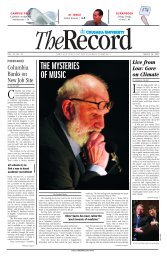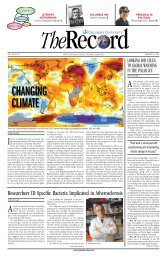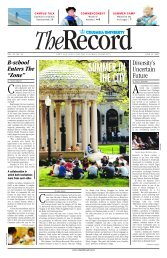September 06, 2007 - Columbia News - Columbia University
September 06, 2007 - Columbia News - Columbia University
September 06, 2007 - Columbia News - Columbia University
Create successful ePaper yourself
Turn your PDF publications into a flip-book with our unique Google optimized e-Paper software.
4<br />
SEPTEMBER 6, <strong>2007</strong><br />
TheRecord<br />
FACULTY PROFILE<br />
New Leader for<br />
Africa Institute<br />
continued from page 1<br />
reconstructing the historical linkages across these regions,”<br />
said Sheldon Pollock, the department chair. Nicholas Dirks,<br />
vice president for arts and sciences and professor of anthropology<br />
and history, praised Diouf for his commitment to the<br />
development of African studies across the social sciences, policy<br />
studies, the humanities and the arts.<br />
Educated principally in France, Diouf is a renowned West<br />
African scholar who has taught in his native Senegal at the<br />
<strong>University</strong> Cheikh Anta Diop in Dakar and guest-lectured at<br />
many European and American universities. He served as director<br />
of the research and documentation program of the<br />
Council for the Development of Social Science Research in<br />
Africa (CODESRIA). At Michigan, he also served in the Center<br />
for Afro American and African Studies. Diouf’s research and<br />
teaching focuses on urban, political and cultural history in<br />
colonial and postcolonial Africa. His appointment is in the<br />
Department of Middle East and Asian Languages and Cultures.<br />
He will teach a graduate course on Pan-African studies this fall.<br />
His appointment returns the institute to the School of<br />
International and Public Affairs, where it was suspended in the<br />
20<strong>06</strong>-07 academic year as the school searched for a new fulltime<br />
director to succeed Mahmood Mamdani, a professor of<br />
anthropology who returned full time to teaching. Since joining<br />
<strong>Columbia</strong> in July, Diouf’s top priority has been to ensure the<br />
reopening succeeds, and to that end, he plans to reach out to<br />
other Africa-related organizations and programs at <strong>Columbia</strong>,<br />
in New York City and at other universities. The institute must<br />
also work with nearby Harlem, he said.<br />
“I think it is impossible to have a program like ours here<br />
and not be involved with Harlem,” said Diouf, emphasizing the<br />
natural bridge between the institute and a vital community of<br />
African Americans and African immigrants. He hopes to establish<br />
a significant connection between <strong>Columbia</strong> and Harlem to<br />
discuss such topics as African influences in black American<br />
culture, how Africa is represented there and how the two cultures<br />
intersect.<br />
<strong>Columbia</strong>’s location in New York City makes it ideally<br />
situated to pull together the diverse groups involved with<br />
Africa, he added.<br />
Students and curriculum are also at the top of Diouf’s list<br />
of priorities, and he recognizes the challenge to regaining<br />
trust among students who were upset about the institute’s<br />
year-long disappearance.<br />
“We have to help define the institute, but the students are<br />
going to take on the most important role because [it] has to<br />
serve them first,” said Diouf. One of his first priorities is a town<br />
meeting with students, who he hopes will speak freely and fuel<br />
a bigger discussion on what the institute can offer now that<br />
it has reopened.<br />
Lincoln Ajoku, a student and president of SIPA’s Pan-African<br />
Network (SPAN), calls the reopening a positive development<br />
that students will welcome, particularly because they and others<br />
at <strong>Columbia</strong> dedicated to Africa were vigilant in<br />
Sacks<br />
continued from page 1<br />
an intermediary between art and science,<br />
although that sounds awfully grandiose,” Sacks<br />
said. In coming to <strong>Columbia</strong>, he will pursue his<br />
longtime interest in schizophrenia, and in that<br />
vein, he plans to see patients and consult with<br />
<strong>Columbia</strong>’s experts in the fields. Dr. Jeffrey A.<br />
Lieberman, the Lawrence E. Kolb Chairman of<br />
Psychiatry at <strong>Columbia</strong>’s College of Physicians<br />
and Surgeons and himself a specialist in schizophrenia,<br />
said he and his colleagues are “thrilled”<br />
at Sacks’ appointment. “We are looking forward<br />
to collaborating with him to elucidate mental illnesses<br />
through his writing. Our psychiatry<br />
trainees, and those in neurology as well, will<br />
greatly benefit from his insight and experience.”<br />
Indeed, Sacks has many admirers at the<br />
<strong>University</strong>. “He writes beautifully, and thinks<br />
extremely well about the brain,” said <strong>University</strong><br />
Professor Eric Kandel, a Nobel laureate in medicine<br />
who strongly encouraged Sacks’ move to<br />
the <strong>University</strong>. “I thought he would be ideal for<br />
<strong>Columbia</strong>,” Kandel said, adding, “This is like a<br />
candy store for him.” Recently, Kandel and Sacks<br />
together interviewed a woman who had musical<br />
hallucinations. “He does not do quantitative science,<br />
not in the conventional sense, he picks up<br />
on themes,” Kandel said. “He often starts with a<br />
neurological problem which has interesting psychological<br />
implications.”<br />
The London-born, Oxford <strong>University</strong>-educated<br />
Sacks, 74, discussed his new job on a recent morning. He<br />
wore a blue <strong>Columbia</strong> T-shirt and sipped from a <strong>Columbia</strong><br />
mug. “In an odd way I really sort of skirted and flitted around<br />
academia for the last 40 years,” he said. He became a writer,<br />
in part, because he’s incapable of seeing a patient or scientific<br />
phenomenon without wanting to know the story<br />
behind it. “For me, interest in science has been inseparable<br />
from stories.”<br />
Although he has had no formal writing training, “apart<br />
from the occasional itinerant meetings with writing classes,”<br />
he said, Sacks is the author of 10 books, most of them bestsellers.<br />
Awakenings was turned into a movie starring Robin<br />
Williams and Robert De Niro. His latest book, Musicophilia:<br />
Tales of Music and the Brain, will be published next month.<br />
Excerpts have appeared in The New Yorker, where he is a<br />
contributing writer, along with <strong>Columbia</strong>’s Nicholas<br />
Lemann, dean of the Journalism School, and Orhan Pamuk,<br />
who won last year’s Nobel Prize in literature and holds<br />
an appointment in Middle East and Asian Languages<br />
and Cultures.<br />
Sacks’ move to <strong>Columbia</strong> is another example of how arts<br />
and sciences can work together. Several years ago, Gregory<br />
Mosher, director of <strong>Columbia</strong>’s Arts Initiative, heard from a<br />
mutual friend that Sacks might be interested in exploring a<br />
role at <strong>Columbia</strong>. Mosher made some calls and before long<br />
the idea of Sacks’ move to <strong>Columbia</strong> took on momentum.<br />
Sacks’ “ability to cross over the arts and cultural life and scientific<br />
life will be wonderful,” Mosher said. “He doesn’t divide<br />
these in his brain. It’s part of who he is.”<br />
ensuring the institute’s operations would not remain<br />
suspended indefinitely.<br />
“<strong>Columbia</strong> will once again have a focal point to promote<br />
and encourage the study of Africa and Africa-related issues,”<br />
said Ajoku. “A reinvigorated institute, which builds upon<br />
lessons learned, is the best way to demonstrate the beginning<br />
of a new era.”<br />
Diouf plans to work toward creating a comprehensive and<br />
modern African studies curriculum. Though <strong>Columbia</strong> provides<br />
a wide range of Africa-related courses and seminars,<br />
what is still missing is a strong, formal, integrated curriculum<br />
on what <strong>Columbia</strong> offers about Africa, he said.<br />
Though the institute re-opened in July, Diouf intends to<br />
work with students in the fall to host a formal launch to celebrate<br />
its official reopening.<br />
“This is one of the few places outside of Africa where Africa<br />
is discussed by Africans and non-Africans,” he said. <strong>Columbia</strong><br />
“can offer a neutral place for discussion.”<br />
EILEEN BARROSO<br />
COLUMBIA PEOPLE<br />
SANDRA HARRIS<br />
CHARLES MANLEY<br />
WHO SHE IS: Assistant Vice President for the Office of<br />
Government and Community Affairs at <strong>Columbia</strong> <strong>University</strong><br />
Medical Center<br />
YEARS AT COLUMBIA: Nine<br />
WHAT SHE DOES: A typical day at the office starts with<br />
a call from a community group seeking to establish a health<br />
education arm with one of CUMC’s departments or schools.<br />
Her job also includes coordinating volunteer programs with<br />
students, community leaders and local public schools.<br />
Because she represents the <strong>University</strong> in community activities,<br />
her days sometimes end at local community meetings,<br />
addressing issues of mental health, public safety and other<br />
social service issues.<br />
AGOOD DAY ON THE JOB: Establishing and promoting<br />
links between community and institutional partners is not as<br />
easy as it sounds. Everyone works on individual time lines,<br />
so it can be challenging to keep all parties on the same page.<br />
A good day on the job is “when after months of program<br />
planning and development, we are finally able to reach<br />
an agreement on scope of work, letters of support,<br />
linkage agreements... just in time to meet our grant or proposal<br />
deadlines.”<br />
HOW SHE CAME TO COLUMBIA: Before <strong>Columbia</strong>, she<br />
served as executive director of Alianza Dominicana’s Family<br />
Center, which provides alcoholism prevention and mental<br />
health services for new immigrant families in Washington<br />
Heights and Inwood. “As a social worker, mental health has<br />
always been my area of interest,” she said. Coming to<br />
<strong>Columbia</strong> “afforded me the opportunity to address mental<br />
health and health care policy issues at the national level<br />
while involving major health care providers and community<br />
stakeholders.”<br />
MOST MEMORABLE MOMENT: Harris helped bring<br />
Yankee shortstop Derek Jeter to a community health fair<br />
organized by her department. More than 2,000 community<br />
residents attended and received free health screenings and,<br />
of course, a photo with the famous athlete. Harris also recalls<br />
filling the Alumni Auditorium with 700 inner city youths to<br />
watch Momma’s Boyz, a gang-prevention theater presentation<br />
by Repertorio Espanol. ~<br />
BEST PART OF HER JOB: “Every day I truly get the<br />
opportunity to be resourceful.” Harris is constantly learning<br />
about what health policies and research discoveries the<br />
faculty are making and how those, in turn, contribute to<br />
the community and overall goal of improved health care<br />
access and quality of life in Washington Heights and<br />
Inwood.<br />
IN HER SPARE TIME: Harris enjoys spending time with<br />
her three children, Frank, Julio and Sandy, as well as her parents,<br />
siblings and their children. A typical family gathering<br />
can include 20 family members. She also loves dancing the<br />
merengue and going to the movies.






